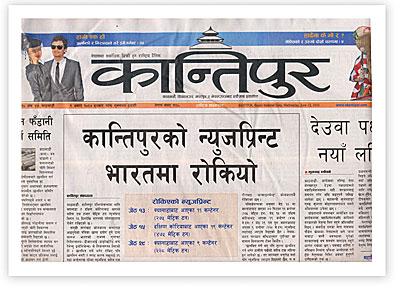 |
In The Clash of Civilizations, Samuel P Huntington characterises India as the 'core-state' of Hindu civilisation. The Indian government, however, behaves more like a besieged nation.
The Indian embassy's role in the Machine Readable Passport deal exposed the risks to trade. In a similar controversy in the 1980s, King Birendra had to acquiesce to New Delhi's pressure to rescind a road-building contract awarded to a Chinese company and give the Kohalpur Mahakali Highway to an Indian company.
This didn't buy Birendra any goodwill. India imposed an undeclared economic blockade anyway in 1989 on the pretext of the expiry of the trade and transit treaty. Disruption in access to the international market for 18 months crippled the Nepali economy. Overseas investors have been wary ever since about the industrial prospects of this India-locked country.
Sometime ago, someone somewhere decided - the sources of such judgments are invariably indeterminate - that the editorial policy of Kantipur Publications was detrimental to Indian interests. In June, Kantipur Publications found ad bookings from Nepal-based multinationals were pulled out.
In media financing models, ad revenue is the fuel that keeps the engine of enterprise humming. To obstruct it in a planned manner is a veiled attack on its very existence. Kantipur Publications is still facing up to the attack on its economic viability with fortitude.
Other hostilities have been more direct. In a step an unnamed South Block official inadvertently admitted was 'cheap tactics', the Indian authorities in June delayed the customs clearance of newsprint meant for Kantipur Publications for nearly a month at Kolkata port. The Indian embassy in Kathmandu said it was a 'routine administrative measure', but the clarification contained veiled warnings.
Following an uproar in the Nepali and Indian media over curbs on press freedom, there was a 'summit meeting' of sorts between the owner-managers of Kantipur Publications and the Indian ambassador. Nobody knows for sure what really transpired at the meeting: the tone of press communiqu�s issued afterwards by contending parties differed widely. Rumours about continuing coldness in the relationship began to float the moment only 11 out of 39 containers held at Kolkata port were released initially.
Sources in Lainchaur insist that the cessation of Indian hostilities against Kantipur Publications is contingent upon a continuous performance appraisal. The media in Kathmandu seems to have imbibed the lessons of the fracas: treading on Indian toes is fraught with untold risks.
A measure directed against the market leader has succeeded in frightening the entire media.
A similar attempt in the past, when the supposed misdemeanours of a cartoonist in a metro daily was greeted with an ad moratorium, ended with corporate groveling. The then home minister stood guarantee for the 'good behaviour' of the media owner. There is no news about promises made and warnings issued this time.
The silence of Kantipur Publications has been deafening since the release of the containers from Kolkata. The change in the editorial tone of Kantipur since the Lainchaur Summit is not yet pronounced. However, Kantipur Publications owes its readers and well-wishers an explanation. When the three estates of the state are so enfeebled, it's impossible for the fourth estate to withstand political and diplomatic pressure. But when the media has to step back from telling the whole truth, it needs to share its compulsions with its readers and offer them an explanation.
An ignoble dimension of the Kantipur saga was the relative neglect of the whole affair by the rest of the Nepali media. Journalists failed to examine the controversy and turn it into an issue of self-censorship and the freedom of the press.
State and non-state groups are relatively easily identifiable enemies of the free media. Commerical and diplomatic pressures are much more hidden, and often impossible to withstand. When the two combine, truth is the only defense.
READ ALSO:
Hard choices, PRASHANT JHA
Tail between our legs, PUBLISHER'S NOTE
Nay to the government, INDU NEPAL
Systemic failure, ASHUTOSH TIWARI
Complicity journalism, CK LAL



